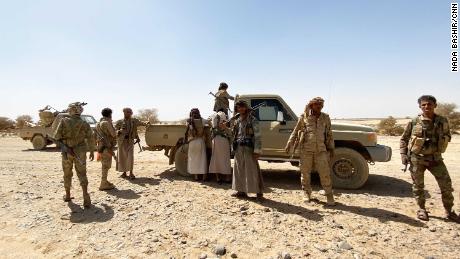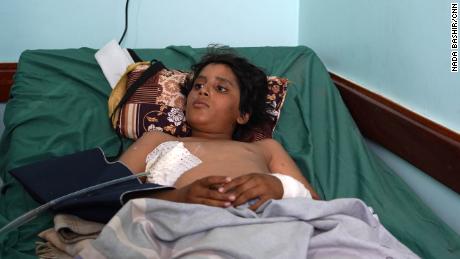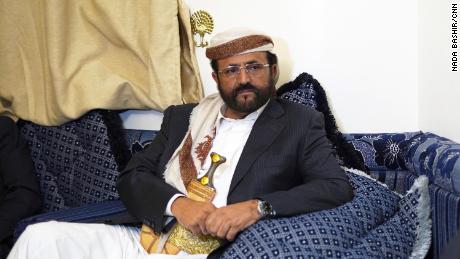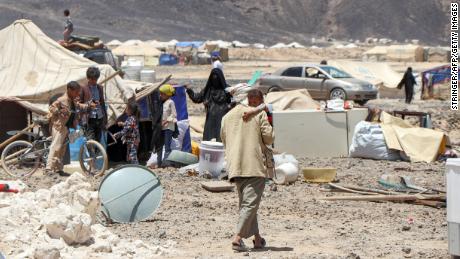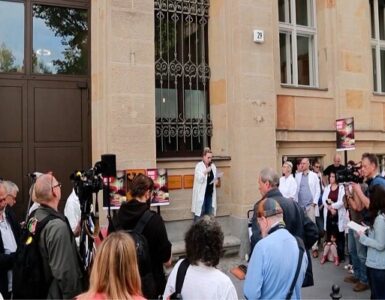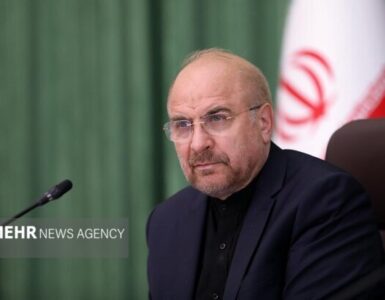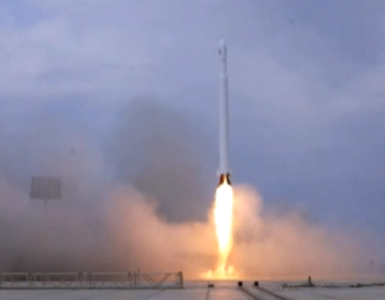The fabled desert oasis, and reputed home to the Queen of Sheba, is today hot, dry and dusty. The rainy season approaches, as does an anticipated Iran-backed Houthi offensive.
Empty plastic bags and crumpled water bottles interspersed with freshly planted trees shaped into hearts line a newly crafted meridian. Fading posters of Yemen’s President Abdu Rabu Mansour Hadi hang alongside much newer images of the city’s latest war hero-turned-Houthi target, the head of Yemen’s special forces, killed late February. His replacement was also killed, just this week.
The scenes serve as a metaphor of Marib’s place in Yemen. It is a tiny island of hope in a sea of discarded dreams. After six years of war, the city of more than 2 million people has emerged as pivotal in Yemen’s future. It is a gateway to much of the country’s oil and gas wealth, and home to a growing population of internally displaced persons (IDPs). It’s also the internationally-recognized Yemeni government’s last major stronghold in the north.
CNN was in Marib at the invitation of the Yemeni government.
If it lost Marib, Hadi’s government and its Saudi backers would have little leverage at eventual peace talks with Houthi rebels, would lose military credibility, and likely encourage the Houthis to continue fighting.
The Houthis control almost everything west of Marib including the Yemeni capital of Sanaa. Tribes hold shifting sway east and in the mountains immediately south of Marib. The nation’s other big powerbroker, the Southern Transitional Council (STC), dominate in the deep south particularly around the potentially lucrative port city of Aden and have already indicated they would be unwilling to partner with a weakened Hadi.
Hadi, the head of the internationally recognized government, has been in forced exile since the Houthis chased him out in 2015. While some of his ministers still live in Yemen, Hadi remains holed up in Riyadh, a mostly impotent encumbrance to his backers, his value limited to his (unopposed) election, and the aura of democracy that confers on his government.
As proxy wars go, Yemen is more complex than most, with many interests at play. Saudi Arabia wants stability and a friendly government in Sanaa.
Iran has an opportunity through its Houthi proxies to keep its nemesis Saudi Arabia bogged down and out of other regional adventures more vital to its interests. The UAE, which backs the STC, benefits from the war’s crippling effect on Aden port because it shifts potential maritime business there to Dubai. The tribes will mop up surplus cash and back its source, in much the way Yemen’s last strongman Ali Abdullah Saleh ran the country through carefully controlled largesse.
While the UAE and Saudi claim unity of purpose, most Yemenis don’t buy it. Between the two Arab Gulf States, their Western allies and Iran, most Yemenis feel victim to outside powers beyond their control.
The Saudi-led coalition specifically has been blamed for at least 18,500 civilian deaths in its air campaign backing the Yemeni army, according to the UN. In recent months, Saudi warships have blocked oil tankers from docking at the port of Hodeidah, exacerbating the north’s fuel shortages and worsening the world’s worst humanitarian crisis. Oil and other supplies continue to arrive through other routes, however, including through Yemeni government-controlled territory.
Meanwhile, the Houthis are blamed by many for dragging Yemen into crisis by taking over vast swathes of the country in 2014. And many are concerned that the UAE has a vested interest in Yemen’s instability.
What is clear in Marib is that without war and disorganized leadership, prosperity could be within reach. The region sits atop ample oil and gas reserves, enough to raise 16.2 million people (or around half the nation) out of the food insecurity they currently endure, and breathe life into the moribund economy.
As one minister told CNN: “Yemen is a diamond in the hands of coal merchants.” If he meant his own political class he didn’t say so.
But people here say blame doesn’t just reside locally. They point to US President Joe Biden’s recent decision to end American support for Saudi Arabia’s military campaign against Houthi rebels. The move reverses an eleventh hour decision by Donald Trump in the final days of his administration that brought backlash from bipartisan politicians and humanitarian organizations.
In meetings with government and tribal leaders this past week, Biden’s recent revocation of the Houthis’ designation as a foreign terrorist organization was the main talking point. All feel that Biden’s diplomacy has emboldened the Houthis, resulting in a ramping up of attacks on Marib. The city is a long-desired jewel in the group’s constellation of country-wide conquests.
Yemeni officials are trying to figure out if Biden is out of his depth, miscalculating the Houthis, or if his Yemen policy is simply a by-product of his policy to entice Iran back to compliance with the nuclear deal, or the Joint Comprehensive Plan of Action (JCPOA).
By backing off on the Houthis, the President could be throwing a bone to their putative sponsors in Tehran, the Yemeni government believes. Either way, people here fear he is storing up problems for the future.
Yemen’s Information Minister Moammar al-Eryani plays a video of a man he says is an injured Houthi fighter, captured during a recent attack. His captors ask him why he has come to Marib. His answer: “to kill Americans.”
Doesn’t Biden understand, several ministers said, that the Houthis, like the Iranian government, tell supporters that “America is the devil”? They argue that empowered Houthis could create a generation of anti-Americanism and potential for terrorism where none previously existed.
By design or default, Biden has created a new pivot in Yemen’s war here in Marib and the Houthis’ reinvigorated reach for the city it is forcing all sides to face dormant questions.
That the Yemeni government’s principal backers, the Saudi government, recently offered the Houthis a countrywide ceasefire, and are calling for more international pressure on the rebels, is a significant sign that the diplomatic ground in Yemen is shifting.
But the Houthis response has been ambiguous at best, disingenuous at worst. US officials accuse them of choosing to fight rather than help bring peace, though the Saudis also ramped up airstrikes in the weeks leading up to the ceasefire offer. At the time, the Houthis were rapidly advancing on Marib and Saudi Arabia was trying to stop the rebel group in its tracks.
A slight Houthi lull in attacks in recent weeks, both on Saudi Arabia and Marib, has been accompanied with a little back-channel diplomacy with Yemeni officials. But the Yemeni government still think that the Houthis are dragging their feet. The rebels seem intent to talk while at the same time trying to complete military gains on the ground before any final peace deal takes shape.
According to sources familiar with the talks, the Houthis demand a three-step ceasefire from the Saudis. First an end to airstrikes, then a ceasefire along the Saudi-Yemen border, and only then a ceasefire inside Yemen.
As Saudi airstrikes are one of the only counter measures holding back the Houthi push for Marib, the rebels’ counteroffer has been a non-starter so far.
Along the fragile front lines near Marib, government forces are very thinly dispersed, and a low and incomplete mud berm is all that separates them from the Houthis in plain sight across the near-flat scrubland less than half a mile away.
Guns and armor are old, ammunition is limited and the spotty encampments are tiny and primitive, with soldiers living under trees, in mud caves and tattered tents.
Tribal fighters make up for the shortfall among government forces. The army is running a rearguard action to keep soldiers paid and moral up.
A recent frontline visit witnessed exchanges of heavy gun barrages, as commanders were clearly concerned about Houthi drones able to pinpoint them and surge a hasty attack.
There’s good reason for concern. Marib’s special forces have lost their commander twice in the past two months and, while the Houthis are selective whom they go after, their success rate has officials more rattled they were a few years ago.
The government defense minister, army chief of staff, and Marib’s most powerful tribal leader, the provincial governor, swear that the city won’t fall, that they will hold it “with their last drop of our blood.”
Ask any of Marib’s power brokers what comes next and they pause before answering, then describe the status quo.
Get the international community to pressure the Houthis, the army chief of staff explains, and “we will fight with our coalition partners to take back the capital.”
Tribal fighters commanded by the powerful provincial governor Sultan al-Aradah are crucial in propping up the flimsy front line. Inside the city, he carries more authority than the government.
He says the war is being forced upon them. “War takes our blood, men, women, children, institutions and resources,” he said. “It weakens our economy and sovereignty, but we are plagued with a terrorist group that has forced itself upon us and hijacked the institutions of this country.
A particular oasis of calm in Marib is the ophthalmic clinic run by Dr. Sahar al Mismari. She trained in Yemen and Syria before that country’s war began, she hastily explains as she leads CNN on a tour of the tiny but productive facility.
Money comes from Saudi’s humanitarian King Salman fund, but the clinic’s success — it has treated 42,000 patients since it opened in October 2019, including 2,400 surgeries, sometimes as many as 20 per day according to Dr. Mismari — comes from the dedication and determination of the Yemeni staff whom return to homes every day that risk Houthi shelling.
They are transforming lives with same-day walk-in cataract and other eye surgeries, as well as providing free reading glasses for whomever needs them, school children included.
Mismari’s tiny world suggests a rose-tinted tomorrow that Yemenis could live in, given the chance.
Then there’s another less certain future. Ekhlas is a second-year English language student at Marib’s Queen of Sheba University.
Her dream is to become a translator. Her father, Ali, who saved her and her siblings from Houthi attacks in Sanaa in 2015 then took them from the capital, where he was a university professor, never imagined that, six years later, he’d still be sheltering them from war.
He is passionate for his daughter’s success but worries what kind of life she can have.
A surge in fighting would shutter classes, and maybe even force her family to flee again. As for translating in Yemen, opportunities are negligible. Western businesses are mostly long gone, and even aid agencies have scaled back to working minimums.
Nadia Yayha’s die seems already cast. She leads a life of fear, as she raises two young children, daughter Samaher, 5, and son Hamam, 2, with a third due any day. She lives in the ramshackle al Jufaina IDP camp, Marib’s largest.
By the standards of many of Yemen’s 4 million wartime displaced, however, Yayha is well off. Al Jufaina is home to about 24,000 families and is Marib’s longest established camp. In the nearby al-Suwaida camp the displaced live in wind-worn and desert-scorched tents.
Yayha has one tiny room. A cheap TV hangs lopsidedly on the rough plastered wall. A bare electrical cable running between window frame and breeze-block wall supplies the power. There is no running water. It is rudimentary in the extreme.
Her husband fled the capital when the war began. He was one year shy of his IT degree. Yayha followed three years later. She says he now takes whatever work he can get.
The upsurge in Houthi rocket attacks is unnerving them, and her children who have known nothing but war are frightened when they hear the explosions, she says. If the fighting comes to Marib, she adds, they will have to leave.
Which one of Yemen’s possible futures becomes reality depends much on Biden’s calculus to push the country towards peace. Pressure Saudi, pressure Hadi’s government and ease back on the Houthis appears to be his current approach.
Marib may yet prove the international lever that ultimately prompts compromise, but for now, anything could happen.

